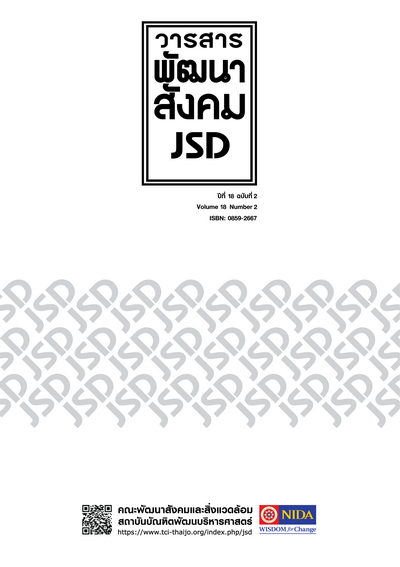องค์กรปกครองส่วนท้องถิ่น กับการประยุกต์ใช้แนวคิดเศรษฐกิจสีเขียว : กรณีศึกษาเทศบาลตำบลเมืองแกลง อำเภอแกลง จังหวัดระยอง
Main Article Content
Abstract
การศึกษานี้มีวัตถุประสงค์เพื่อศึกษาการก่อรูปทางความคิด กระบวนการ และการนำแนวคิดเศรษฐกิจสีเขียวไปปฏิบัติ รวมทั้งสรุปตัวแบบจากการนำแนวคิดเศรษฐกิจสีเขียวไปปฏิบัติในเทศบาลตำบลเมืองแกลง อำเภอแกลง จังหวัดระยอง โดยใช้การวิจัยเชิงคุณภาพ เก็บข้อมูลจากเอกสารและการสัมภาษณ์ ปรากฏผลวิจัย ดังนี้ ประการแรก การก่อรูปของแนวคิดเศรษฐกิจสีเขียวของเทศบาลตำบลเมืองแกลงนั้น มีจุดเริ่มต้นมาจาก 3 องค์ประกอบที่สำคัญ คือ (1) การขึ้นมาดำรงตำแหน่งนายกเทศมนตรีของนายสมชาย จริยเจริญ (2) ความต้องการแก้ไขวิกฤตการณ์ที่เกิดขึ้นในพื้นที่ และ (3) การสนับสนุนองค์ความรู้ของหน่วยงานและองค์กรต่าง ๆ ประการที่สอง กระบวนการและการนำแนวคิดเศรษฐกิจสีเขียวไปปฏิบัติในเทศบาลตำบลเมืองแกลงนั้น มี 4 ส่วนที่สำคัญ คือ (1) การกำหนดยุทธศาสตร์ของการพัฒนาเมือง ที่ต้องการพัฒนาเมืองให้สอดคล้องกับแนวคิด “เมืองน่าอยู่ อย่างยั่งยืน” หรือ “เมืองคาร์บอนต่ำ” (2) การนำระบบการจัดการพลังงานและสิ่งแวดล้อม (ISO 14001) เข้ามาในกระบวนการของนโยบาย (3) การแต่งตั้งผู้รับผิดชอบนโยบายต่าง ๆ และ (4) การสร้างจิตสำนึกและความเข้าใจกับชุมชน ประการที่สาม ตัวแบบ การนำแนวคิดเศรษฐกิจสีเขียวไปปฏิบัติในเทศบาลตำบลเมืองแกลง มีจุดเริ่มต้นจากผู้นำทางการเมืองที่มีความมุ่งมั่นและทุ่มเทในการทำงาน มีเป้าหมายในการพัฒนาที่ชัดเจน เป็นผู้ที่มีความสนใจในเรื่องการรักษาสิ่งแวดล้อม จนนำมาสู่การกำหนดยุทธศาสตร์การพัฒนาองค์กรสู่เป้าหมายตามความต้องการของผู้บริหาร ไม่ว่าจะเป็น “เมืองน่าอยู่ อย่างยั่งยืน” หรือ “เมืองคาร์บอนต่ำ” ซึ่งทั้งสองแนวคิดนี้ส่งผลให้เกิดนโยบายต่าง ๆ ภายใต้การควบคุมของระบบ ISO 14001 และการดูแลจากผู้รับผิดชอบโครงการ นำไปสู่ผลการปฏิบัติงานที่จะทำการประเมิน ตรวจสอบ และทบทวนโดยผู้บริหารเทศบาลตำบลเมืองแกลงก่อนที่จะมีการตัดสินใจว่าจะยุติโครงการหรือดำเนินโครงการนั้นต่อไป
คำสำคัญ: องค์กรปกครองส่วนท้องถิ่น แนวคิดเศรษฐกิจสีเขียว เทศบาลตำบลเมืองแกลง
The Local Administrative Organization and the Application of the Concept of Green Economy:A Case Study of Mueangklaeng Sub-district Municipality, Klaeng District,Rayong Province, THAILAND
This study aims at studying the concept, process, and practices for implementing the green economy approach. In addition, the study summarizes the model of green economy development, which is appropriate for Mueangklaeng sub-district municipality, Rayong province, Thailand. This research is qualitative, based on documents and interviews. The finding showed that the establishment of the green economy concept in Mueangklaeng sub-district municipality originated from three main components: (1) the vision of Mr. Somchai Chariyacharoen, who was selected as mayor; (2) the willingness to solve crises in the local area; and (3) the role of supporting organizations. Moreover, the process and practices for implementing a green economy in Mueangklaeng sub-district municipality can be divided into four essential elements: (1) strategic planning in accordance with the idea of a “livable and sustainable city” or “low-carbon city;” (2) the application of ISO 14001 was included in part of the policy planning and implementation; (3) appointment of knowledgeable persons that can take responsibility for policy implementation; and (4) raising awareness and understanding within communities. Consequently, the emergence of the green economy concept in Mueangklaeng sub-district municipality originated from the devoted, environmental concerns and strong determination of the political leader with his administrative vision, together with the vision of “a livable and sustainable city” or “low-carbon city.” These visions led to various policies under the influence of ISO 14001 and the good responsibility of the project managers. For considering these various factors, the executives of Mueangklaeng sub-district municipality would review all of the processes and practices for assessment prior to making decisions for continuing or ceasing the projects.
Keywords: Local Administrative Organization, Green Economic Concept, Muangklaeng Sub-district Municipality


